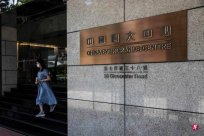The latest global academic freedom report released by an international research institution showed that after the implementation of the Hong Kong National Security Law in 2020, Hong Kong's academic freedom ranking fell sharply, ranking 152 among 179 countries and regions.
The report was written by V-Dem Institute, a democratic issue research institution headquartered in Sweden.According to the definition of the institute, the academic freedom index is based on five indicators, including research and teaching freedom, academic exchanges and dissemination freedom, school autonomy, campus integrity, and academic and cultural expression freedom.The research institutions are calculated based on 1 score, and then divided into a level with each 0.2 points. For example, 0.8 to 1 belongs to A -level A. The establishment of A to E has five levels in total, ranking in 179 countries or regions.
The report pointed out that Hong Kong's academic freedom index in 2022 dropped from 0.75 in 2012 to 0.23, fell to D -level, and the ranking also fell from 20%to 40%before to 10%to 20%at the end of the list.EssenceAccording to the analysis of similar reports in the past, there are extensive infringement of academic freedom.
TheReport believes that Beijing officials entered into the Hong Kong National Security Law in the summer of 2020, which brought unprecedented pressure on Hong Kong's academic freedom, causing academic freedom to fall rapidly.The Hong Kong government has pushed the patriotic "red education" in major middle schools, commemorating June 4th's slogans and sculptures, and university students will be forced to dissolve, and university professors have left.
The report describes that of the 179 countries and regions around the world, only five small countries have improved academic freedom; the academic freedom of 152 countries has stagnated; universities and scholars in 22 countries and regions, academic freedoms enjoyed todayTen years ago, there was a significant and substantial decline, and Hong Kong was one of the regions that were named.
Among the 179 countries and regions in the world, the Czech Republic ranked first, and North Korea respected the last seat.On both sides of the strait, Taiwan performed the best, with 0.84 points, which belongs to Class A; mainland China has only 0.07 points, which belongs to E -Class.
TheReport specifically explained the issue of academic freedom of mainland China, and pointed out that the ruling party formulated the allowable scope of academic research, academic exchanges and public speeches. In 2017Regulations on the work of grass -roots organizations in general colleges and universities in the government have made comprehensive standards on the work of grass -roots party organizations in universities.
Reverse information, in recent years, many universities in Hong Kong have increased the government's influence in schools. Earlier, the reorganization plan of the Chinese University's university's school board was even more attracted, and the sound of supporting and opposing the principal Duan Chongzhi.On the other hand, many Hong Kong scholars have also moved to other places in recent years. For example, political scholar Ye Jianmin moved to the UK this year.He pointed out that the humanistic spirit of the University of Hong Kong is no longer, and the space to comment on current politics and participation in public affairs almost no longer exists. Farewell to Hong Kong to find Xintiandi.
Research refers to Hong Kong's 152nd Hong Kong scholars in the world refers to obviously inconsistent with the facts
Chen Weiqiang, a lecturer in Hong Kong University of Technology Hong Kong Specialty College, believed that after the Hong Kong National Security Law came into effect, Hong Kong's academic freedom space was indeed much smaller than before, especially in the field of social disciplines.For example, a famous scholar may be interested in studying the history of the Hong Kong independence movement. Although he does not support Hong Kong independence, he did not dare to study because he was worried about touching the Red Line of the National Security Law.
But Chen Weiqiang also pointed out that the above research refers to Hong Kong's ranking of 152 in the world, which is obviously inconsistent with facts. The academic freedom space of many countries is smaller than Hong Kong.In addition, in recent years, many Chinese scholars in the United States have returned to Hong Kong to engage in academic research, which also reflects that Hong Kong's academic freedom is not as bad as the outside world says.


